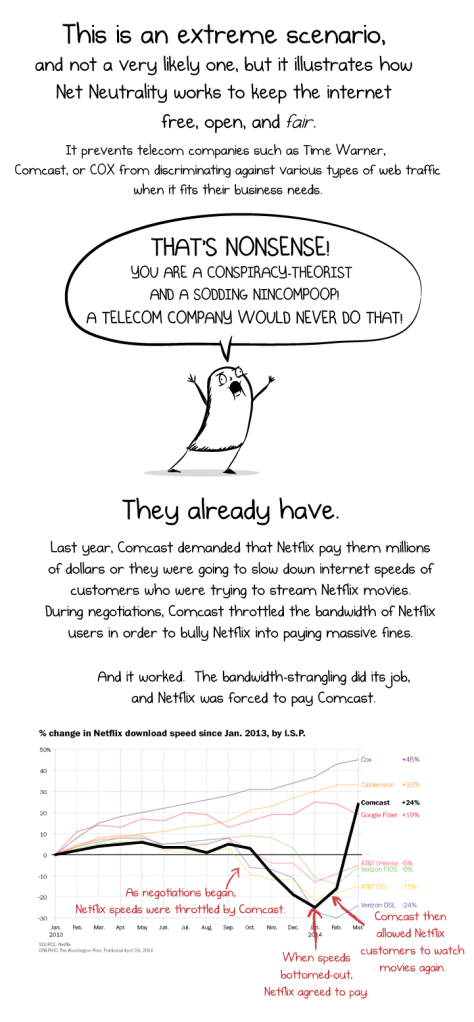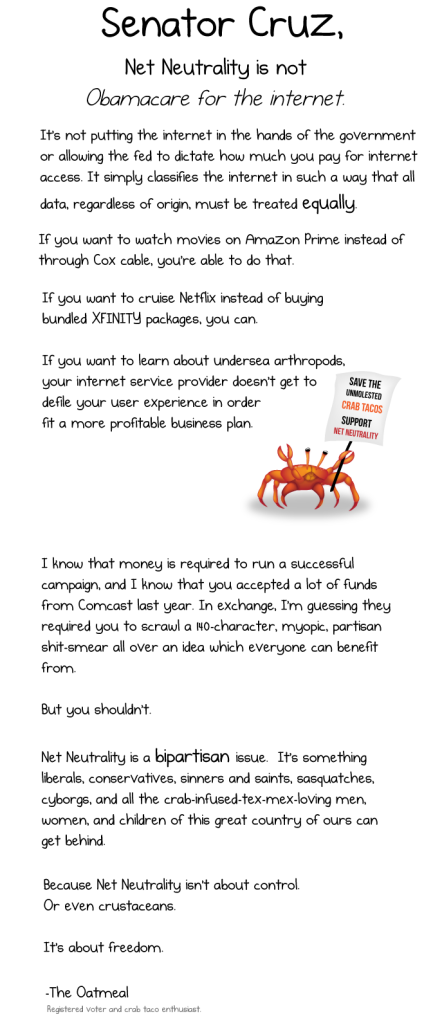From the readings, what exactly is Net Neutrality? Explain in your own words the arguments for and against Net Neutrality. After examining the topic, where do you stand on the issues surrounding Net Neutrality?
- If you are in favor of Net Neutrality, explain how you would implement or enforce it. How would you respond to concerns about possible over-regulation, burdening corporations, or preventing innovation?
- If you are against Net Neutrality, explain why it is unnecessary or undesirable. How would you respond to concerns about providing level playing fields or preventing unfair discrimination by service provides?
- In either case, discuss whether or not you consider that “the Internet is a public service and fair access should be a basic right”.
Ironically enough, in my procrastination for doing my homework today, I was reading theSkimm and it even referenced net neutrality—in regards to Netflix. Netflix recently exposed that they have been limiting streaming speeds over certain cellular data networks (AT&T and Verizon specifically). They said they were attempting to keep users data usage in check. And they were saying that this was not violating net neutrality, which they are big supporters of.
Net neutrality is “the idea that your cellular, cable, or phone internet connection should treat all websites and services the same. Big companies like AT&T, Verizon, and Comcast want to treat them differently so they can charge you more depending on what you use” (I thought this website did a really nice job of explaining it). So Netflix wants net neutrality so that anyone using their service doesn’t have to pay more to use it. Cable companies want Netflix to pay more because there is often very high traffic on their site, but obviously Netflix doesn’t want to pay an increased rate on something they already have, and feel is unjust as is.

I think that initially, when reading about net neutrality, the initial predisposition would be to compare it to Obamacare as Senator Cruz compares it. Net neutrality doesn’t involve government directly, but rather prevents ISPs the ability to charge certain websites more money for streaming capabilities. It prevents service providers from creating monopolies in the industry and from making money for running an internet service during peak times at the same bandwidth they have at lower demand. To me, it’s very clear that there should be net neutrality—there only people being hurt by having it really are the service providers and those in the government being paid to support those ISPs. And honesty, they make enough money that I don’t feel too bad. If restricting the Internet means that certain people can’t use it and access it a the availability they can now, then it definitely isn’t worth the fractionally faster speeds. The picture below is a fun and easy way to understand net neutrality.

So in regards to the internet being a basic right—as of now, it is considered one, and so to take away access to it would infuriate the American population. No one should be deprived of the wealth of information that is contained in the Internet, especially not by IPS or the government. The beauty of the internet is that it was created in order for people to use it and to share information on it and to bring about a smarter population on the whole. Almost all people have access to a landline telephone—the internet needs to be the same way. The internet is one of the greatest educational resources available, and to restrict access to something that was never created to be restricted would be cruel.